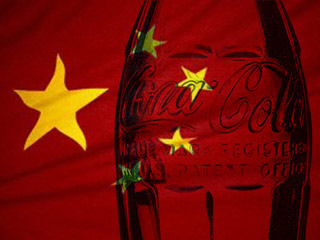Beijing 2008 : Sponsors Cashing In On Oppression Olympics
Posted by keith on February 22nd, 2008
Some more reportage from those brilliant people at www.unmadeinchina.org. This time its the sponsors they are having a go at. In a way it’s difficult to accuse a company as crassly destructive as Coca Cola or BHPBilliton of hypocrisy in sponsoring the Oppression Olympics (I think that’s what I’ll call them from now on), but as all of the non-Chinese companies purport to be ethical in some way, then it is vital that their names are made public.
If you click on the names you will be able to send a mail to them.
Worldwide (Permanent) Olympic Partners*:
Coca Cola (j.brock@cokecce.com)
Atos Origin (more-info@atosorigin.com)
General Electric (jeffery.immelt@ge.com)
Johnson & Johnson (wweldon@jnj.com)
Kodak (antonio.perez@kodak.com)
IBM (trading as Lenovo) (ameliow@us.lenovo.com)
Manulife (dominic_d’alessandro@manulife.com)
McDonalds (james.skinner@mcd.com)
Omega Watches (nicolas.hayek@swatchgroup.com)
Panasonic (taylorj@us.panasonic.com)
Samsung (klee@sta.samsung.com)
Visa (hmorris@visa.com)
(* These companies are able to influence Olympic policy)
Non-Chinese Beijing 2008 Partners:
Volkswagen
Adidas
Sponsors:
UPS
Haier
Budweiser
BHPBilliton
Exclusive Suppliers:
UPS
Snickers
Technogym
Staples
Aggreko
Schenker
(Full lists at http://en.beijing2008.cn/bocog/sponsors/sponsors/)
As for every Olympic game, the Beijing 2008 sponsorship is organized in tiers:
- The TOP sponsors (who usually sponsor more than one edition of the Games)
- The Sponsors
- The Suppliers (both exclusive-and not).
How many are there? As Mr. Gerhard Heiberg, Chairman of the Marketing Commission of the International Olympic Committee proudly states “since the marketing program for the Beijing 2008 Olympic Games was launched on September 1, 2003, a total of 54 enterprises have become Games partners, sponsors and suppliers.”
Is “54 enterprises” a big number? In other words: what is this “marketing program” really worth, at the economic level?
Official numbers are not yet available, but we can take a look at http://www.olympic.org/uk/organisation/facts/revenue/index_uk.asp the official result of the previous 4-year period (2001-2004). We learn that “Olympic Movement generated a total of more than $4,000 million USD in revenue during the most recent Olympic quadrennium.”
That’s more than 4 billion dollars revenue for marketing. That is, minimal costs to be subtracted.
That was in the far 200-2004, now we are talking of Beijing 2008, “the Games which the world has never seen before” (again, quotes from Mr. Heiberg).
Quite a lot of money, isn’t it? Imagine the campaign… But, wait, there’s not that much advertising of the Olympics (compared to the marketing budget)… Why is that? Once again, the very same Mr. Heiberg comes to our aid: “We are aware that over-commercialization is detrimental to the Olympic Movement and all our sponsors, our partners understand it and accept it”.
Yes, Mr. Heiberg, let’s not make it evident what the Olympics really are, it could be detrimental…
Nice business strategy! What kind of “Olympic spirit” is that?
(from http://www.unmadeinchina.org/contStd.asp?lang=en&idPag=63)






February 22nd, 2008 at 6:00 am
[…] Original post by keith […]
February 23rd, 2008 at 12:23 am
Interesting – 54 seems a bit low for such a major event, but I imagine it must cost some big bucks to get on that list.
February 23rd, 2008 at 5:40 am
Certainly does. 4 billion dollars is quoted in the report, and the Worldwide Partners won’t be paying less than $100m each.
February 29th, 2008 at 5:27 am
nice
August 21st, 2008 at 10:41 am
Well, as this (http://www.financialpost.com/story.html?id=727802) article points out, Kodak and Lenovo are no longer sponsoring the games so you should focus your efforts on the others since Kodak and Lenovo will no longer have any impact on the Olympic “movement”.
August 24th, 2008 at 5:34 am
How do you explain these pages then, John?
http://2008.lenovo.com
http://www.kodak.com/eknec/PageQuerier.jhtml?pq-path=13013&pq-locale=en_US&_requestid=863
Sponsorship may be waning for economic reasons, but certainly there is no hint of ethical standards improving.
Keith